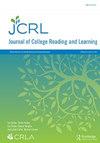A Note from the Editorial Team
Q2 Social Sciences
引用次数: 0
Abstract
Greetings from the JCRL Editorial team! In this final issue of 2023, we are excited to bring you four articles covering a range of timely topics. The issue opens with “‘We’re Not All Chemists in Here – We’re Just Trying to Get to the Next Level:’ Examining Out-of-School Literacies, Identity, and Disciplinary Literacy,” by Minkyung Choi. This article addresses the challenges in disciplinary literacy development for students in science courses. Through a series of interviews, a qualitative study found that positive previous academic encounters contributed to disciplinary literacy development, while a strong science identity enhanced performance and resilience. The author urges literacy professionals to consider the interplay between prior experiences, background knowledge, and science identity in fostering disciplinary literacy for higher education science students. In “On the Challenges of Decomposing Whiteness: Foundations for Antiracist Literacies,” Patrick Bruch, Jr., explores the intersection of composition studies and critical Whiteness studies, emphasizing the need to confront Whiteness in higher education. The author considers how challenging Whiteness can advance racially conscious research and offers examples of students grappling with Whiteness-based epistemologies, while underscoring the importance of dismantling White privilege and promoting equity. Writing classrooms are highlighted as spaces for students to critically examine and decompose Whiteness, encouraging them to take political responsibility for their language practices. Next, in “The Unanticipated Virtual Year: How the Big 5 Personality Traits of Openness to Experience and Conscientiousness Impacted Engagement in Online Classes During the COVID-19 Crisis,” Élodie Audet, Shelby Levine, and Pascale Dubois use two-wave prospective longitudinal designs to examine the role of the Big 5 personality traits on student engagement in online classroom environments. The study was conducted during the Fall 2020 and winter 2021 semesters with two separate cohort groups of university students. The authors found that the source of student motivation and level of online engagement shifted as students experienced online learning over an extended period. Finally, in “Critical Reading and Student Self-Selected Texts: Results of A Collaborative, Explicit Curricular Approach,” Jill Parrott and Trenia Napier consider whether students’ ability to critically assess and utilize sources can be improved by a competency-based curriculum designed to integrate information literacy, critical reading, and writing. JOURNAL OF COLLEGE READING AND LEARNING 2023, VOL. 53, NO. 4, 255–256 https://doi.org/10.1080/10790195.2023.2258056编辑团队的注释
本文章由计算机程序翻译,如有差异,请以英文原文为准。
求助全文
约1分钟内获得全文
求助全文
来源期刊

Journal of College Reading and Learning
Social Sciences-Linguistics and Language
CiteScore
1.60
自引率
0.00%
发文量
23
期刊介绍:
The Journal of College Reading and Learning (JCRL) invites authors to submit their scholarly research for publication. JCRL is an international forum for the publication of high-quality articles on theory, research, and policy related to areas of developmental education, postsecondary literacy instruction, and learning assistance at the postsecondary level. JCRL is published triannually in the spring, summer, and fall for the College Reading and Learning Association (CRLA). In addition to publishing investigations of the reading, writing, thinking, and studying of college learners, JCRL seeks manuscripts with a college focus on the following topics: effective teaching for struggling learners, learning through new technologies and texts, learning support for culturally and linguistically diverse student populations, and program evaluations of developmental and learning assistance instructional models.
 求助内容:
求助内容: 应助结果提醒方式:
应助结果提醒方式:


